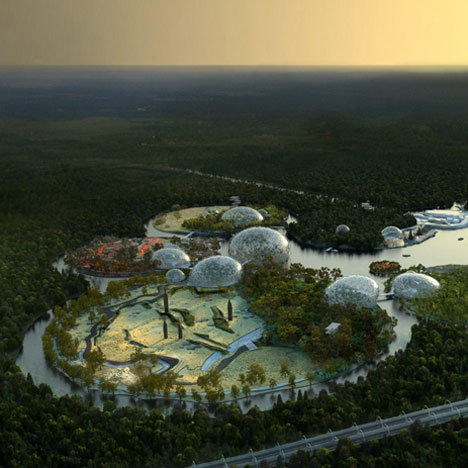Paris landscape designers TN Plus and architects Beckmann N’Thépe have won a competition to design a zoological park on a series of artificial islands for the outskirts of St Petersburg.
Spread across 300 hectares, the park will replace the historic but cramped city-centre zoo.
The site will be arranged to loosely reflect the layout of the Earth's continents when they first began to separate.
Different species of animals will be located in their native zones within this diagram.
Construction is scheduled for completion in 2014.
Click above for larger image
More stories about zoos on Dezeen »
The following information is from the architects:
New Saint Petersburg Zoo
Primorskiy’s Zoological Parc
Landscape designers: TN Plus / Architects: Beckmann N’Thépe
Bruno Tanant et Jean Christophe Nani – Landscape designers TN Plus, Aldric Beckmann et Françoise N’Thépé - Architects Beckmann N’Thépé, win the international compétition for the completion of the Primorskiy’s new zoological Park, Saint-Petersburg (Russia).
Founded in 1865 Saint-Petersburg zoo is the oldest zoological park of Russia. As most of other parks across Russia, it suffers today from a cruel lack of space, being located in the heart of the historical town center. The city has hence decided to create a new zoo, which will range over 300 hectares, on the town’s outskirts, escaping this way the high population density of the urban area. The project preserves a large strech of land, and implements an environmentally beneficial approach.
Click above for larger image
Concept
Thousands and thousands of years ago, the surface of the earth was but one and only supercontinent, known as the Pangea. Subject to tectonic forces, the Paleolithic Pangea over time broke into splinters, which slowly organised themselves in a configuration that, although always prone to movements, we still are familiar with. Ecosystems, once linked with each others, are today kept apart by oceans and seas. Species of the same origin have followed a distinct path on each separated continent.
The project offers a symbolic sample of every continent in an attempt to recreate the illusion of a reunited Pangea within the very zoological park of Saint-Petersburg. The archipelago therefore created will be made of islands representing South East Asia, Africa, Australia, South America, North America and Eurasia, the two latter being linked with each other by the pack ice of the Arctic Pole. The chosen site enjoys a profuse water supply, and hence is particularly fitted for such an insular organization of the various environments.
Click above for larger image
Project
Nowadays the environment requirements and the green consciousness of the public are increasingly considered a core issue. The very background of a zoological park itself induces a mandatory respect of those values. Harshly criticized for a long time, zoological parks are today considered major stakeholders of biodiversty preservation. Even though it is an artificially recreated leisure area, the Primorskiy Park is above all an educational tool allowing each and everyone of us to better grasp our own history, and also a research center helping to preserve our Earth. So much goals were aimed both by architects and landscape designers of this project who managed to convince and share their ambitions.
Zoological Park of Saint-Petersburg
Expected time of complétion: 2014
Surface : 96 ha on a total area of 300 ha
3474 animals ( 479 species)

